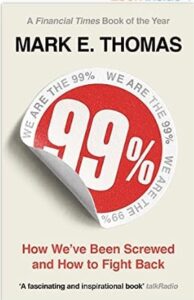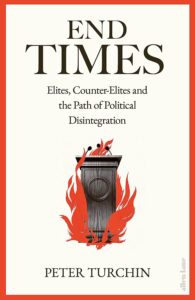Most Europeans can’t understand why Americans vote for Trump. He is a liar, misogynist and a narcissist. He lacks the charisma of a populist like Boris Johnson; his speeches are long, rambling, humourless and frankly boring. What then is his appeal? He wouldn’t stand a chance of being elected in Europe. Why then Is he so popular in America?
 George Monbiot , writing in the Guardian thinks he has part of the answer https://www.theguardian.com/commentisfree/2024/jan/29/donald-trump-americans-us-culture-republican. He identifies Trump as the ‘king’ of those who display an ‘extrinsic’ personality, that is those that:
George Monbiot , writing in the Guardian thinks he has part of the answer https://www.theguardian.com/commentisfree/2024/jan/29/donald-trump-americans-us-culture-republican. He identifies Trump as the ‘king’ of those who display an ‘extrinsic’ personality, that is those that:
are strongly motivated by the prospect of individual reward and praise. They are more likely to objectify and exploit other people, to behave rudely and aggressively and to dismiss social and environmental impacts. They have little interest in cooperation or community. People with a strong set of extrinsic values are more likely to suffer from frustration, dissatisfaction, stress, anxiety, anger and compulsive behaviour.
But why would anyone want to follow someone like that? As with all populists his views chime with all those that feel threatened by those that are ‘not one of us’: often characterised as immigrants, homosexuals, those with a black skin and so on. But why is he a successful populist?
Monbiot believes the answer is tied up with the American dream – the belief that success is possible for anyone who works hard enough. It is this vision that drove the growth of the American economy for the past two centuries. However, the dream is souring. Inequality has increased massively in the last few decades. More and more wealth is becoming concentrated in the hands of the top 1% of the population. American society is now less mobile than most of Europe’s. Inherited wealth has frozen movement between classes; a new rich ‘aristocracy’ has been created. Those with wealthy parents go to better schools, better universities and have better access to the top jobs, leaving those from poor backgrounds with much less opportunity to be successful.
When people fail to reach their expected level of wealth, they naturally look for someone or something to blame. Trump blames the ‘deep state’ – a mythical conspiracy of left leaning people in education, government, the law, and the press. This resonates with people who are struggling and angry that the American Dream has passed them by. In former times the workers would have rounded on the factory bosses, but now in this dog-eat-dog society it is those who govern or administer who are seen as the enemies of the people. Most Europeans can’t understand why Americans vote for Trump. He is a liar, misogynist and a narcissist. He lacks the charisma of a populist like Boris Johnson; his speeches are long, rambling, humourless and frankly boring. What then is his appeal? He wouldn’t stand a chance of being elected in Europe. Why then Is he so popular in America?
George Monbiot , writing in the Guardian thinks he has part of the answer https://www.theguardian.com/commentisfree/2024/jan/29/donald-trump-americans-us-culture-republican. He identifies Trump as the ‘king’ of those who display an ‘extrinsic’ personality, that is those that:
are strongly motivated by the prospect of individual reward and praise. They are more likely to objectify and exploit other people, to behave rudely and aggressively and to dismiss social and environmental impacts. They have little interest in cooperation or community. People with a strong set of extrinsic values are more likely to suffer from frustration, dissatisfaction, stress, anxiety, anger and compulsive behaviour.
But why would anyone want to follow someone like that? As with all populists his views chime with all those that feel threatened by those that are ‘not one of us’: often characterised as immigrants, homosexuals, those with a black skin and so on. But why is he a successful populist?
Monbiot believes the answer is tied up with the American dream – the belief that success is possible for anyone who works hard enough. It is this vision that drove the growth of the American economy for the past two centuries. However, the dream is souring. Inequality has increased massively in the last few decades. More and more wealth is becoming concentrated in the hands of the top 1% of the population. American society is now less mobile than most of Europe’s. Inherited wealth has frozen movement between classes; a new rich ‘aristocracy’ has been created. Those with wealthy parents go to better schools, better universities and have better access to the top jobs, leaving those from poor backgrounds with much less opportunity to be successful.
When people fail to reach their expected level of wealth, they naturally look for someone or something to blame. Trump blames the ‘deep state’ – a mythical conspiracy of left leaning people in education, government, the law, and the press. This resonates with people who are struggling and angry that the American Dream has passed them by. In former times the workers would have rounded on the factory bosses, but now in this dog-eat-dog society it is those who govern or administer who are seen as the enemies of the people. It is this mobilisation of anger against a common enemy of ‘them’, that is the secret of Trump’s appeal. The failure of the American Dream is the reason for Trump’s success.
Extrinsic behaviour is opposed to the principles of Eco-humanity. It will inevitably lead to more discord and conflict in society. Its popularity, as demonstrated by Trump, is threatening to us all.

 The depressing news from Israel and Gaza is a reminder to us all of the destructive force of antagonistic tribes. As Dostoevsky said: ‘“People speak sometimes about the “bestial” cruelty of man, but that is terribly unjust and offensive to beasts, no animal could ever be so cruel as a man, so artfully, so artistically cruel.”
The depressing news from Israel and Gaza is a reminder to us all of the destructive force of antagonistic tribes. As Dostoevsky said: ‘“People speak sometimes about the “bestial” cruelty of man, but that is terribly unjust and offensive to beasts, no animal could ever be so cruel as a man, so artfully, so artistically cruel.” The most important bi-product of the study of economics has been the creation and collection of measures of commercial and financial activity. We now know to a reasonable degree of accuracy a country’s total sales, investment, income, exports and imports. We know how this income is distributed – what share goes to company bosses and what is the average income of the poor. We have (less reliable) estimates of total monetary wealth and what proportion is owned by the top 10%. We know how many people are unemployed and of those how many are simply unable to work.
The most important bi-product of the study of economics has been the creation and collection of measures of commercial and financial activity. We now know to a reasonable degree of accuracy a country’s total sales, investment, income, exports and imports. We know how this income is distributed – what share goes to company bosses and what is the average income of the poor. We have (less reliable) estimates of total monetary wealth and what proportion is owned by the top 10%. We know how many people are unemployed and of those how many are simply unable to work. Want to know what sort of chaotic government we have? The career of Grant Shapps gives you a guide. Shapps was appointed Transport Secretary on July 24, 2019, as Boris Johnson formed his first cabinet after replacing Theresa May as prime minister. Compared with what was to follow, his time in the role was relatively long-lasting, taking him all the way to Johnson’s resignation on September 6, 2022.
Want to know what sort of chaotic government we have? The career of Grant Shapps gives you a guide. Shapps was appointed Transport Secretary on July 24, 2019, as Boris Johnson formed his first cabinet after replacing Theresa May as prime minister. Compared with what was to follow, his time in the role was relatively long-lasting, taking him all the way to Johnson’s resignation on September 6, 2022. Ever feel that, although you have a vote, nothing you want to happen ever gets done? Elective democracies give most of us a tiny bit of power but absolutely no influence. But what if you were rich? All you would have to do is to offer to make a significant party donation and you would immediately have the ear of those in government.
Ever feel that, although you have a vote, nothing you want to happen ever gets done? Elective democracies give most of us a tiny bit of power but absolutely no influence. But what if you were rich? All you would have to do is to offer to make a significant party donation and you would immediately have the ear of those in government. Why then should the increasing levels of inequality in the West be destabilising? Peter Turchin in his recently published book End Times has developed an interesting explanation which has implications for all of us. He says increasing levels of inequality have two negative effects that mutually reinforce each other: immiseration and elite overpopulation.
Why then should the increasing levels of inequality in the West be destabilising? Peter Turchin in his recently published book End Times has developed an interesting explanation which has implications for all of us. He says increasing levels of inequality have two negative effects that mutually reinforce each other: immiseration and elite overpopulation. In the first part of this book Paul Johnson explains clearly and succinctly the British Tax system: its rules and its consequences. The second part summarises the challenges ahead. In addition to Climate Change the biggest future issue results from Britain’s aging population. Not only will health and social care costs ramp up but also the proportion of those of working age and paying taxes will decline. The Office of Budget Responsibility (OBR) estimates that just to stand still expenditure will have to rise in the next 50 years by almost 10% of national income. This is huge; we currently pay 37% of National Income – taxes will have to go up by 25%. No political party is daring to tell electors this truth.
In the first part of this book Paul Johnson explains clearly and succinctly the British Tax system: its rules and its consequences. The second part summarises the challenges ahead. In addition to Climate Change the biggest future issue results from Britain’s aging population. Not only will health and social care costs ramp up but also the proportion of those of working age and paying taxes will decline. The Office of Budget Responsibility (OBR) estimates that just to stand still expenditure will have to rise in the next 50 years by almost 10% of national income. This is huge; we currently pay 37% of National Income – taxes will have to go up by 25%. No political party is daring to tell electors this truth. Inequality wastes money. The rich fritter away their wealth, buying luxuries and investing in ego projects. This distorts a nation’s economy for the worse. If incomes were spread evenly, ordinary people could invest more in improving their health, education and living conditions, thus increasing the wealth and vitality of society as a whole.
Inequality wastes money. The rich fritter away their wealth, buying luxuries and investing in ego projects. This distorts a nation’s economy for the worse. If incomes were spread evenly, ordinary people could invest more in improving their health, education and living conditions, thus increasing the wealth and vitality of society as a whole. George Monbiot asks the pertinent question. Why, if 16.5 to 28% of greenhouse emissions are due to livestock farming, is this not an urgent subject to be addressed COP27?
George Monbiot asks the pertinent question. Why, if 16.5 to 28% of greenhouse emissions are due to livestock farming, is this not an urgent subject to be addressed COP27?